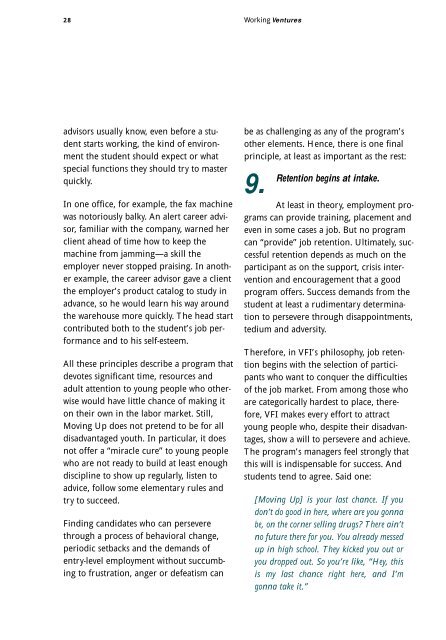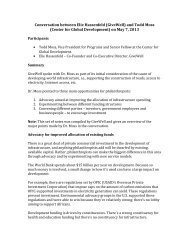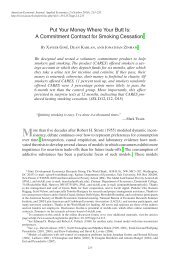Getting In Staying On Moving Up - GiveWell
Getting In Staying On Moving Up - GiveWell
Getting In Staying On Moving Up - GiveWell
Create successful ePaper yourself
Turn your PDF publications into a flip-book with our unique Google optimized e-Paper software.
28 Working Ventures<br />
advisors usually know, even before a student<br />
starts working, the kind of environment<br />
the student should expect or what<br />
special functions they should try to master<br />
quickly.<br />
<strong>In</strong> one office, for example, the fax machine<br />
was notoriously balky. An alert career advisor,<br />
familiar with the company, warned her<br />
client ahead of time how to keep the<br />
machine from jamming—a skill the<br />
employer never stopped praising. <strong>In</strong> another<br />
example, the career advisor gave a client<br />
the employer’s product catalog to study in<br />
advance, so he would learn his way around<br />
the warehouse more quickly. The head start<br />
contributed both to the student’s job performance<br />
and to his self-esteem.<br />
All these principles describe a program that<br />
devotes significant time, resources and<br />
adult attention to young people who otherwise<br />
would have little chance of making it<br />
on their own in the labor market. Still,<br />
<strong>Moving</strong> <strong>Up</strong> does not pretend to be for all<br />
disadvantaged youth. <strong>In</strong> particular, it does<br />
not offer a “miracle cure” to young people<br />
who are not ready to build at least enough<br />
discipline to show up regularly, listen to<br />
advice, follow some elementary rules and<br />
try to succeed.<br />
Finding candidates who can persevere<br />
through a process of behavioral change,<br />
periodic setbacks and the demands of<br />
entry-level employment without succumbing<br />
to frustration, anger or defeatism can<br />
be as challenging as any of the program’s<br />
other elements. Hence, there is one final<br />
principle, at least as important as the rest:<br />
9.<br />
Retention begins at intake.<br />
At least in theory, employment programs<br />
can provide training, placement and<br />
even in some cases a job. But no program<br />
can “provide” job retention. Ultimately, successful<br />
retention depends as much on the<br />
participant as on the support, crisis intervention<br />
and encouragement that a good<br />
program offers. Success demands from the<br />
student at least a rudimentary determination<br />
to persevere through disappointments,<br />
tedium and adversity.<br />
Therefore, in VFI’s philosophy, job retention<br />
begins with the selection of participants<br />
who want to conquer the difficulties<br />
of the job market. From among those who<br />
are categorically hardest to place, therefore,<br />
VFI makes every effort to attract<br />
young people who, despite their disadvantages,<br />
show a will to persevere and achieve.<br />
The program’s managers feel strongly that<br />
this will is indispensable for success. And<br />
students tend to agree. Said one:<br />
[<strong>Moving</strong> <strong>Up</strong>] is your last chance. If you<br />
don’t do good in here, where are you gonna<br />
be, on the corner selling drugs? There ain’t<br />
no future there for you. You already messed<br />
up in high school. They kicked you out or<br />
you dropped out. So you’re like, “Hey, this<br />
is my last chance right here, and I’m<br />
gonna take it.”

















